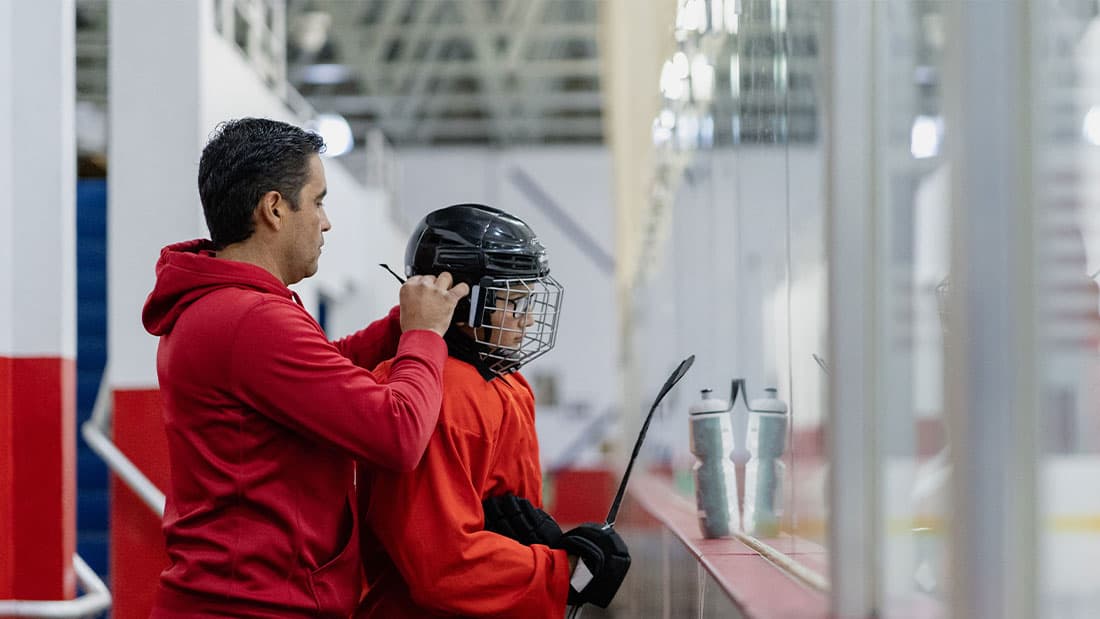5 Steps to Develop Peer Leaders On Your Teams
“The great aim of education is not knowledge, but action.” —Herbert Spencer
If you appreciate having captains on your teams and wish there was more you can do for them and the team, read on for the 5 Steps to developing peer leaders of impact on your teams. The Leadership Fix Game Plan (L.F.G.P.) ‘s ultimate vision is to transform athletes into go-to players, go-to teammates, leaders of impact, and eventually to lifelong learners who continue to be impactful in their service to others.
The 5 specific steps to the L.F.G.P. include:
- Equip Yourself
- Equip ’em;
- talk/Teach ’em Up
- Coach ’em Up
- Transform ’em!
1. Equip Yourself: Toolbox I: Foundational Process Points for Coaches
Toolbox I is a “reality check” about you/staff’s motives for a D.I.Y. L.D. Initiative (Play Call #1), as well as the attention given to their 4 P’s – philosophy, purpose, priorities, and perceptions. All of which are linked to a better understanding of personal leadership beliefs and then applications (Play Call #2).
1st SYSTEM: EQUIP YOURSELF
TOOLBOX I – For Coaches
- Play Set 1: Foundational Process Points-
- Play Call #1: Personal Why’s- What’s: Motives for DIY DL? How/who does this benefit? Your mission as a coach? Program?
- Play Call #2: 4 P’s: Benefits of having good leaders? How do you develop your leadership? Your global purpose as a coach? Your best leadership moment? Managerial/Leadership priorities? Areas you add the most value? Your crucible experience? Model leaders? Future accomplishment areas?
2. Equip ‘Em: Toolbox II: Reality Check Profiles & Leadership I.Q. Audit for Team/Player Leaders/Councils
Toolbox II begins with the how, who, what, when, and why’s of leader selection (Play Call #3). I share the method most of my consulting teams have adopted in selecting team leaders. Play Call #4 is a “reality check” for your team about their perceptions of team dynamics, team visions and values, primary and secondary needs, and leadership strengths/weaknesses of the group. There is a lot to be learned from past leadership experiences and “leaders of impact” models (and less than ideal leaders). So, as part of Play Call #5, potential player leaders are asked reflective questions about their personal leadership experiences, somewhat similar to what their coaches were asked to complete in Play Call #2.
1st SYSTEM (cont.): EQUIP ‘EM
TOOLBOX II – For Team & Player Leaders
- Play Set 2: Reality Check Profiles
- Play Call #3: Leader Selection: feedback from the team for buy-in; team dynamics; strengths; focus areas; Dr. V’s method = seeks volunteers; expectations; reflective questions; team survey; captain platforms; recruiting leaders
- Play Call #4: Team Why’s-What’s: team mission; how does leadership help mission; team identity; progress on a mission; primary needs; challenges
- Play Set 3: Leadership I.Q. Audit
- Play Call #5: Personal Why’s-Lessons Learned: a personal reflection on leadership knowledge/experiences; model leaders & lessons learned from past leaders; motives for your leadership; benefits & pitfalls; contributions to the team.
3. Teach ‘Em Up: Discussions, Chalk Talks, & Action Learning
Player and coach responses can then be discussed to kick-start the second system, Talk/Teach ‘Em Up, of the L.F.G.P. “Talk/Teach ‘Em Up” focuses on the teaching and learning of leadership material from personal experiences to more formal leadership educational concepts and practices. This scheme begins with Play Set 4, which has each coach and player leader or leadership group member share their responses to the reflective question battery regarding their knowledge and experiences with leadership, along with questions about their motives for a leadership role, their model leaders, any crucible experiences (important moments in their lives), and how leadership relates to team effectiveness and winning (Play Call #6). Active discussion of these responses with fellow team leaders and coaches allows all in attendance to learn from each other’s lived experiences, which is the springboard to developing an action plan to strengthen and improve on any particular areas brought up during the discussions (Play Call #7).
2nd SYSTEM: TALK/TEACH ‘EM UP
- Play Set 4: Roundtable Discussions
- Play Call #6: Discuss Reality Check-Leadership IQ Audit: Sharing your particular responses & experiences from the question battery (Play Calls 1-4); notes can be taken of valuable take-aways from these discussions. These notes can be referred back to maximize learning & application
- Play Call #7: Discussion Points Action Plan: For change or improvement to occur, an action plan must be prioritized; create a “To Do” list for all involved, especially team leaders who need to be agents of change. “Starter responsibilities” are then assigned, and follow-up, accountability check-ins must be conducted regularly. “Players do what you inspect, not what you expect.”
- Play Set 5: Educational Chalk-Talks & Action Learning
- Play Call #8: Educational Chalk-Talk Curricula: The old “chalk talks” have been replaced with smart boards, YouTube videos, and hudl, but the message is the same – focus on a narrow set of processes to educate and apply. Ask the team leaders what else they would like to know about being better leaders, and do some research and share what is found. My books and STACK articles cover a lot of leadership concepts, so use them as resources! Use L.A.A.F. principles (learn, apply, action, follow-up), or sections of good leadership books.
Other “teachable moments” included in this system involve going deeper with the teaching of leadership content via Play Set 5, Educational Chalk-Talks, and Action Learning I. This Play Set and specifically Play Call #8 focuses on wide-ranging educational activities specific to team/organizational needs, strength-based leadership, particular focus areas, accountability, character, practices of impactful leaders and supporters (followers), the A-B-C’s of leadership, stress management/balancing responsibilities, and so many other important topics.
4. Coach ‘Em Up: Train & Develop ‘Em Up
This system of playsets and play calls involves providing opportunities for leading so these would-be leaders (coaches, captains, or players) can practice what they are discussing and learning about leadership in authentic settings (Play Set 6, Train’ Em Up). See the text box below. These do not include team bonding games as they do not relate to the context or situational specificity that is required of elite team sport. These can be conducted from time to time for the fun of it. But don’t think they replace formal leadership and team development
3rd SYSTEM: COACH ‘EM UP
- Play Set 6: Train’Em Up
- Play Call #9: Practicing Individual & Teammate Skills – intrapersonal and interpersonal skills are improved, such as on-field responsibilities (warm-ups, encouragement, challenge teammates); complete impactful skillset survey and work on areas that need improvement; begin “starter” responsibilities
- Play Set 7: Develop ‘Em Up
- Play Call #10: Authentic Opportunities – extend roles-responsibilities; use apprenticeships for younger players to “try on” leadership roles; for team leaders, they need to comprise their “platform” or leadership causes that will help the team; service-based activities off-the-field
Training denotes practicing individual leadership skills (communication, leading by example such as being on time and being the model for how things are to be done, developing rapport, asking others how they are doing and showing genuine concern, working alongside coaches, and so on), while practicing being an effective teammate-supporter involves considering other’s perspectives, being a good listener, adhering to standards, and following other’s orders without dispute (Play Call #9).
Development, however, entails the more formal teaching and mentoring of leadership techniques and strategy in authentic settings, not simply in fun activities but on the field or court where the real work of leadership occurs (Play Set 7, Develop ‘Em Up). This vital step is where leaders develop in the authentic setting via reinforcement, feedback, and mentoring processes, not by taking the easy way out by using single events (like a ropes course day) and expect true leadership learning and subsequent change. Creating real, lasting change takes so much more than a single event, or a single event every month, or even once a semester. Again, if only it was that easy! This playset comprises taking full advantage of leadership opportunities, like apprenticeships and personal and collective leadership cause(s) and service-based activities, for team leaders on and off the field (Play Call #10), while ensuring that consistent follow-up and reinforcement practices occur every step of the way which is the true path to leadership transformation (addressed the final system).
5. Transform ‘Em Up: F.T.’s & Legacy
Play Set 8: The last playset focuses on the significance of consistent “on the job” development, or more applicable to the sport context, “on the field or court” educating and mentoring (Play Call #11). This play call is specifically referred to as “follow throughs” (F.T.’s). This is an area that most people drop the ball – they do not do the necessary follow-up to ensure that what is talked about is actually practiced, learned, and afollow-throughsntly. Another valuable assist through this play call is enlightening the player leaders on how best to transfer what is being learned about leadership into other achievement settings, like the classroom, their involvement on campus and in the community, the application of this learning for their future career aspirations, and responsibilities as a socially conscious adult.
4th SYSTEM: TRANSFORM ‘EM UP
- Play Set 8: Transformation
- Play Call #11: F.T.’s – maximizing “hits” (capturing impactful leadership moment) and “misses” (missing impactful leadership moments) in the authentic setting; weekly meetings with staff, where each party provides feedback and follow-up from both parties occur; problem-solving scenarios before they occur (like what happens if a player is late for a team meeting – what will you do?)
- Play Call #12: Legacy – learning from your crucible moments; having answers to the following question: what legacy have you left on this program already? what legacy do you want to leave in your present life situation? what legacy do you want to leave on your little corner of the world? Practice transformative “to-do’s” that impactful leaders reveal on a daily basis.
This “on the job” practice can also take the form of capturing leadership “hits” (well-timed and well-executed leadership efforts), “misses” (inaccurate action or response to a captain moment), along with the lessons learned from both experiences. Assisting the leaders with the transitional process is also presented, as well as preparing a transition (succession) plan, so there will be a seamless transition from this year’s leaders to the next. When all these educational and developmental activities, mentoring feedback, and lessons learned are combined, a culture of leadership emerges, which corresponds with a transformation of players and teams into leaders and effective collaborators.
The final play call to the L.F.G.P., Play Call #12, Legacy, comprises a review of what each individual leader brought with them to this privileging opportunity (crucible), as well as what was learned from their experiences, progress made on their individual and collective leadership platform (project), as well as what their preferred legacy is and to conclude their season, what the actual legacy turned out to be.
Player leaders are expected to expand on their “starter responsibilities” from the seventh playset and simply do more. It is one thing to talk about leadership in the safe confines of the coaches’ offices or in the fun atmosphere of a team-building activity or ropes course, but it is a different thing entirely to lead others in the authentic setting – practice fields, weight room, classrooms, locker room, pre-game meeting rooms, and on the game pitch. The sooner they are integrated into transferring what is learned to all achievement areas, they will transform what they contribute to the team while also helping to strengthen leadership-based traditions (and legacies) and improve the transition for future teams and leaders in the program or department.
The off-season is the ideal time to teach mental, teammate, and leadership skills while creating opportunities for your players to apply what they learn. Don’t get caught up in buzz words and balloon B.S. Go further and use these systems of the L.F.G.P. to not only teach skills but to develop toughness, better teammates, and leaders of impact on your team this off-season.
Portions of this article are from Dr. V’s new book, The Leadership Fix Game Plan (Coaches Choice, 2020), his academic book, The Sports Leadership Playbook (McFarland), and from articles in the Soccer Journal from the United Soccer Coaches Association.
RECOMMENDED FOR YOU
MOST POPULAR
5 Steps to Develop Peer Leaders On Your Teams
“The great aim of education is not knowledge, but action.” —Herbert Spencer
If you appreciate having captains on your teams and wish there was more you can do for them and the team, read on for the 5 Steps to developing peer leaders of impact on your teams. The Leadership Fix Game Plan (L.F.G.P.) ‘s ultimate vision is to transform athletes into go-to players, go-to teammates, leaders of impact, and eventually to lifelong learners who continue to be impactful in their service to others.
The 5 specific steps to the L.F.G.P. include:
- Equip Yourself
- Equip ’em;
- talk/Teach ’em Up
- Coach ’em Up
- Transform ’em!
1. Equip Yourself: Toolbox I: Foundational Process Points for Coaches
Toolbox I is a “reality check” about you/staff’s motives for a D.I.Y. L.D. Initiative (Play Call #1), as well as the attention given to their 4 P’s – philosophy, purpose, priorities, and perceptions. All of which are linked to a better understanding of personal leadership beliefs and then applications (Play Call #2).
1st SYSTEM: EQUIP YOURSELF
TOOLBOX I – For Coaches
- Play Set 1: Foundational Process Points-
- Play Call #1: Personal Why’s- What’s: Motives for DIY DL? How/who does this benefit? Your mission as a coach? Program?
- Play Call #2: 4 P’s: Benefits of having good leaders? How do you develop your leadership? Your global purpose as a coach? Your best leadership moment? Managerial/Leadership priorities? Areas you add the most value? Your crucible experience? Model leaders? Future accomplishment areas?
2. Equip ‘Em: Toolbox II: Reality Check Profiles & Leadership I.Q. Audit for Team/Player Leaders/Councils
Toolbox II begins with the how, who, what, when, and why’s of leader selection (Play Call #3). I share the method most of my consulting teams have adopted in selecting team leaders. Play Call #4 is a “reality check” for your team about their perceptions of team dynamics, team visions and values, primary and secondary needs, and leadership strengths/weaknesses of the group. There is a lot to be learned from past leadership experiences and “leaders of impact” models (and less than ideal leaders). So, as part of Play Call #5, potential player leaders are asked reflective questions about their personal leadership experiences, somewhat similar to what their coaches were asked to complete in Play Call #2.
1st SYSTEM (cont.): EQUIP ‘EM
TOOLBOX II – For Team & Player Leaders
- Play Set 2: Reality Check Profiles
- Play Call #3: Leader Selection: feedback from the team for buy-in; team dynamics; strengths; focus areas; Dr. V’s method = seeks volunteers; expectations; reflective questions; team survey; captain platforms; recruiting leaders
- Play Call #4: Team Why’s-What’s: team mission; how does leadership help mission; team identity; progress on a mission; primary needs; challenges
- Play Set 3: Leadership I.Q. Audit
- Play Call #5: Personal Why’s-Lessons Learned: a personal reflection on leadership knowledge/experiences; model leaders & lessons learned from past leaders; motives for your leadership; benefits & pitfalls; contributions to the team.
3. Teach ‘Em Up: Discussions, Chalk Talks, & Action Learning
Player and coach responses can then be discussed to kick-start the second system, Talk/Teach ‘Em Up, of the L.F.G.P. “Talk/Teach ‘Em Up” focuses on the teaching and learning of leadership material from personal experiences to more formal leadership educational concepts and practices. This scheme begins with Play Set 4, which has each coach and player leader or leadership group member share their responses to the reflective question battery regarding their knowledge and experiences with leadership, along with questions about their motives for a leadership role, their model leaders, any crucible experiences (important moments in their lives), and how leadership relates to team effectiveness and winning (Play Call #6). Active discussion of these responses with fellow team leaders and coaches allows all in attendance to learn from each other’s lived experiences, which is the springboard to developing an action plan to strengthen and improve on any particular areas brought up during the discussions (Play Call #7).
2nd SYSTEM: TALK/TEACH ‘EM UP
- Play Set 4: Roundtable Discussions
- Play Call #6: Discuss Reality Check-Leadership IQ Audit: Sharing your particular responses & experiences from the question battery (Play Calls 1-4); notes can be taken of valuable take-aways from these discussions. These notes can be referred back to maximize learning & application
- Play Call #7: Discussion Points Action Plan: For change or improvement to occur, an action plan must be prioritized; create a “To Do” list for all involved, especially team leaders who need to be agents of change. “Starter responsibilities” are then assigned, and follow-up, accountability check-ins must be conducted regularly. “Players do what you inspect, not what you expect.”
- Play Set 5: Educational Chalk-Talks & Action Learning
- Play Call #8: Educational Chalk-Talk Curricula: The old “chalk talks” have been replaced with smart boards, YouTube videos, and hudl, but the message is the same – focus on a narrow set of processes to educate and apply. Ask the team leaders what else they would like to know about being better leaders, and do some research and share what is found. My books and STACK articles cover a lot of leadership concepts, so use them as resources! Use L.A.A.F. principles (learn, apply, action, follow-up), or sections of good leadership books.
Other “teachable moments” included in this system involve going deeper with the teaching of leadership content via Play Set 5, Educational Chalk-Talks, and Action Learning I. This Play Set and specifically Play Call #8 focuses on wide-ranging educational activities specific to team/organizational needs, strength-based leadership, particular focus areas, accountability, character, practices of impactful leaders and supporters (followers), the A-B-C’s of leadership, stress management/balancing responsibilities, and so many other important topics.
4. Coach ‘Em Up: Train & Develop ‘Em Up
This system of playsets and play calls involves providing opportunities for leading so these would-be leaders (coaches, captains, or players) can practice what they are discussing and learning about leadership in authentic settings (Play Set 6, Train’ Em Up). See the text box below. These do not include team bonding games as they do not relate to the context or situational specificity that is required of elite team sport. These can be conducted from time to time for the fun of it. But don’t think they replace formal leadership and team development
3rd SYSTEM: COACH ‘EM UP
- Play Set 6: Train’Em Up
- Play Call #9: Practicing Individual & Teammate Skills – intrapersonal and interpersonal skills are improved, such as on-field responsibilities (warm-ups, encouragement, challenge teammates); complete impactful skillset survey and work on areas that need improvement; begin “starter” responsibilities
- Play Set 7: Develop ‘Em Up
- Play Call #10: Authentic Opportunities – extend roles-responsibilities; use apprenticeships for younger players to “try on” leadership roles; for team leaders, they need to comprise their “platform” or leadership causes that will help the team; service-based activities off-the-field
Training denotes practicing individual leadership skills (communication, leading by example such as being on time and being the model for how things are to be done, developing rapport, asking others how they are doing and showing genuine concern, working alongside coaches, and so on), while practicing being an effective teammate-supporter involves considering other’s perspectives, being a good listener, adhering to standards, and following other’s orders without dispute (Play Call #9).
Development, however, entails the more formal teaching and mentoring of leadership techniques and strategy in authentic settings, not simply in fun activities but on the field or court where the real work of leadership occurs (Play Set 7, Develop ‘Em Up). This vital step is where leaders develop in the authentic setting via reinforcement, feedback, and mentoring processes, not by taking the easy way out by using single events (like a ropes course day) and expect true leadership learning and subsequent change. Creating real, lasting change takes so much more than a single event, or a single event every month, or even once a semester. Again, if only it was that easy! This playset comprises taking full advantage of leadership opportunities, like apprenticeships and personal and collective leadership cause(s) and service-based activities, for team leaders on and off the field (Play Call #10), while ensuring that consistent follow-up and reinforcement practices occur every step of the way which is the true path to leadership transformation (addressed the final system).
5. Transform ‘Em Up: F.T.’s & Legacy
Play Set 8: The last playset focuses on the significance of consistent “on the job” development, or more applicable to the sport context, “on the field or court” educating and mentoring (Play Call #11). This play call is specifically referred to as “follow throughs” (F.T.’s). This is an area that most people drop the ball – they do not do the necessary follow-up to ensure that what is talked about is actually practiced, learned, and afollow-throughsntly. Another valuable assist through this play call is enlightening the player leaders on how best to transfer what is being learned about leadership into other achievement settings, like the classroom, their involvement on campus and in the community, the application of this learning for their future career aspirations, and responsibilities as a socially conscious adult.
4th SYSTEM: TRANSFORM ‘EM UP
- Play Set 8: Transformation
- Play Call #11: F.T.’s – maximizing “hits” (capturing impactful leadership moment) and “misses” (missing impactful leadership moments) in the authentic setting; weekly meetings with staff, where each party provides feedback and follow-up from both parties occur; problem-solving scenarios before they occur (like what happens if a player is late for a team meeting – what will you do?)
- Play Call #12: Legacy – learning from your crucible moments; having answers to the following question: what legacy have you left on this program already? what legacy do you want to leave in your present life situation? what legacy do you want to leave on your little corner of the world? Practice transformative “to-do’s” that impactful leaders reveal on a daily basis.
This “on the job” practice can also take the form of capturing leadership “hits” (well-timed and well-executed leadership efforts), “misses” (inaccurate action or response to a captain moment), along with the lessons learned from both experiences. Assisting the leaders with the transitional process is also presented, as well as preparing a transition (succession) plan, so there will be a seamless transition from this year’s leaders to the next. When all these educational and developmental activities, mentoring feedback, and lessons learned are combined, a culture of leadership emerges, which corresponds with a transformation of players and teams into leaders and effective collaborators.
The final play call to the L.F.G.P., Play Call #12, Legacy, comprises a review of what each individual leader brought with them to this privileging opportunity (crucible), as well as what was learned from their experiences, progress made on their individual and collective leadership platform (project), as well as what their preferred legacy is and to conclude their season, what the actual legacy turned out to be.
Player leaders are expected to expand on their “starter responsibilities” from the seventh playset and simply do more. It is one thing to talk about leadership in the safe confines of the coaches’ offices or in the fun atmosphere of a team-building activity or ropes course, but it is a different thing entirely to lead others in the authentic setting – practice fields, weight room, classrooms, locker room, pre-game meeting rooms, and on the game pitch. The sooner they are integrated into transferring what is learned to all achievement areas, they will transform what they contribute to the team while also helping to strengthen leadership-based traditions (and legacies) and improve the transition for future teams and leaders in the program or department.
The off-season is the ideal time to teach mental, teammate, and leadership skills while creating opportunities for your players to apply what they learn. Don’t get caught up in buzz words and balloon B.S. Go further and use these systems of the L.F.G.P. to not only teach skills but to develop toughness, better teammates, and leaders of impact on your team this off-season.
Portions of this article are from Dr. V’s new book, The Leadership Fix Game Plan (Coaches Choice, 2020), his academic book, The Sports Leadership Playbook (McFarland), and from articles in the Soccer Journal from the United Soccer Coaches Association.











